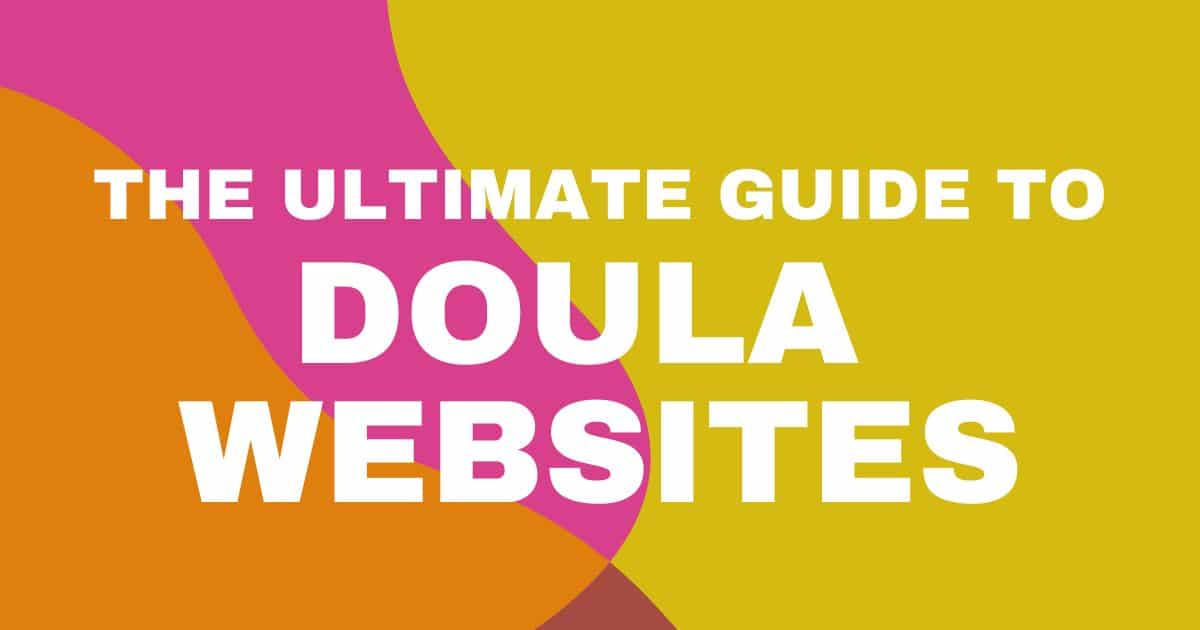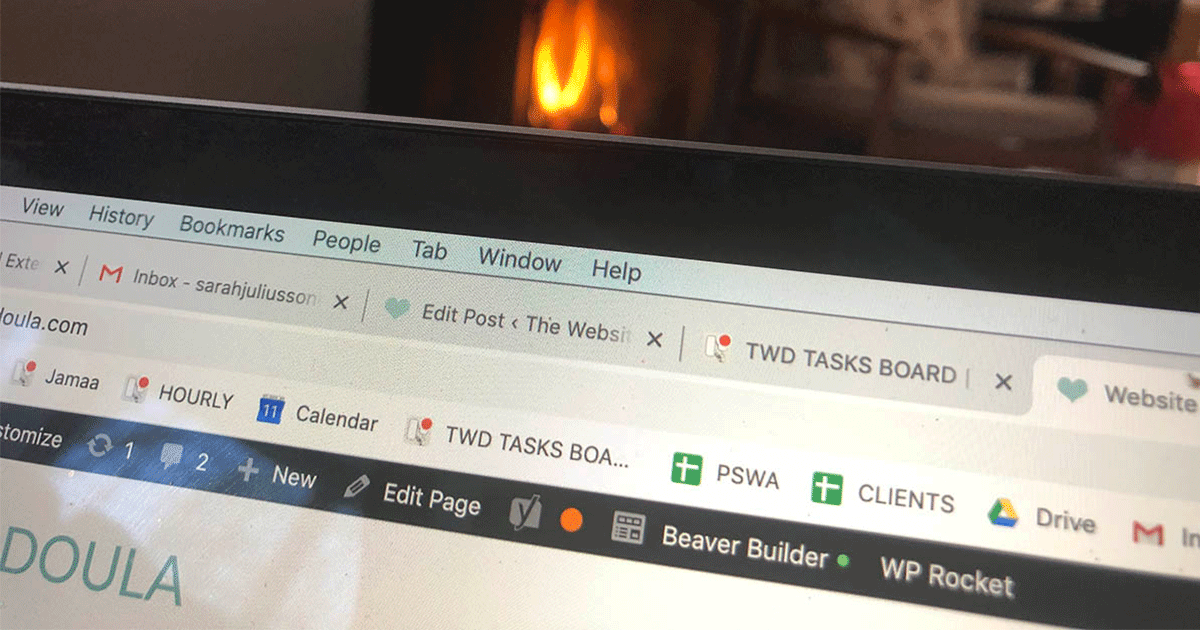Why your Website Needs a Privacy Policy

As a health and wellness provider, you are deeply invested in the quality of care you provide your clients. Whether you are a midwife, chiropractor, reiki master, or postpartum doula, you hear countless deeply personal stories in the course of your care. Whether or not your profession is mandated to follow HIPAA guidelines, you of course safeguard these with the utmost care to ensure their privacy and trust in you. But what about the information they share with you through your website?
This is unfortunately where many of us are falling short. As a business owner, there are different standards expected of you than if you were simply sharing health information with a close friend.
- Think about how many private details are shared with your business through your intake form – Name, Email, Address, Phone, Birthdays, Pregnancy History…
- Along with that comes the hidden ways you are gathering information. IP addresses so your analytics can tell where site visitors are coming from. Facebook or Google advertising based on their activity on your site or a link they click in one of your emails. Embedded YouTube videos. And so on…
A privacy policy is a legal document telling consumers the types of information you are gathering & how you are safeguarding them. It is, essentially, a statement of good faith that you are taking their privacy seriously.
I invite you to consider the countless times you have clicked on a link, or searched for something, and then seen your facebook feed instantly display related products or services. That is your data being used to sell you things. Like it or not, our personal data is Everywhere, and it is being used constantly to try and get us to spend money. A privacy policy offers you protection from these behaviors as well as ensuring your private details aren’t shared without your consent. Why wouldn’t you want to offer the same protection for your site visitors?
Legal Protection for your Business
Current privacy laws are continually changing and vary from state to state, and country to country. So if you are only serving clients in California, or New Jersey, your requirements will be different than someone serving clients across the country or even globally.’
A Privacy Policy establishes the following:
- What data is being collected from site visitors
- Why and how that data is being used.
- If, and how that data is shared with third-party companies.
- The rights site visitors have to access their data & have it removed and how to do so.
- Your company contact information
I know all of this sounds like A LOT. There are lots of random templates available online, but there is no way to know if they match the laws in your specific state nor the data practices of your business. And most of you likely don’t have a lawyer to turn to to draft a policy for you.
Thankfully, there are tools out there that make this a whole lot simpler. I now recommend the Termageddon Privacy Policy & Cookies tool to all my clients. Scroll to the bottom of this post for details on your 10% discount!

Are you Required to have a Privacy Policy?
Are you officially legally required to have one? That depends on your location, but it is considered Best Practice for all businesses with websites to have one.
Note: if you are in one of the following states you DEFINITELY due to local laws:
- California Consumer Privacy Act (CCPA)
- Colorado Privacy Act (CPA)
- Connecticut Personal Data Privacy Act (CTDPA)
- Virginia Consumer Data Protection Act (VCDPA)
- Additional states in the USA, including Texas, Iowa, Oregon, Montana, Indiana, Tennessee, Florida, Delaware, New Jersey & New Hampshire, have all passed legislation that will take effect within the next year.
It’s only a matter a time before laws extend universally. Check out this map of the USA outlining current privacy laws in each state.
Even if it is not yet 100% required in your state, it will be soon. And you’re not likely to be paying too much attention to that, are you? Plus, today’s consumers expect there to be a privacy policy. They may not read it (and most likely will NOT) but simply having it there establishes you as a trustworthy business. 88% of users say their willingness to share personal data depends on how much they trust a company. (PwC)
GLOBAL PRIVACY POLICY LAWS
- Canada Personal Information and Electronics Documents Act (PIPEDA)
- Quebec Law 25
- European Union General Data Protection Regulation (GDPR)
- Australia Privacy Act 1988
- New Zealand Privacy Act 2020
- Brazil General Personal Data Protection Law (LGPD)
- China Personal Information Protection Law (PIPL)
A Privacy Policy Can Help your SEO!
While it’s certainly not the defining factor in whether or not you show up on page one of search results, a privacy policy is one of many factors Google is considering when deciding on how to rank your website.
Worried your Privacy Policy will be Ugly on your Site Design?
You don’t have to include it in your main navigation, but it should be visible in your footer across every page on your website. The link itself should be easily visible, but it doesn’t have to be up top! Along with the link, you may need an initial browser pop-up allowing site visitors to choose their cookies. I know it’s not ideal, but it goes a long way to building trust in your brand and protecting you from legal challenges.
Don’t have a Policy? Here are the Risks
FINES. You’re likely a small business, and it’s hard to imagine someone coming after you. Still, there are significant government fines if you are determined to violate privacy laws in your state (I’m talking several thousand dollars).
LAWSUITS. Consumers can a lawsuit against businesses for failing to protect their consumer data. And yes, they can do so even if it’s simply because you don’t HAVE a privacy policy! OUCH.
How to Make a Privacy Policy
I know it is REALLY tempting to just pull a random template from the internet. Google Privacy Policy and you will find Plenty to choose from. The problem is you just can’t know if it matches your location and business needs, leaving you legally vulnerable. There are so many details that go into making sure your Privacy Policy aligns 100% with your needs to protect you – and your site visitors.
I highly recommend Termageddon for your site privacy policy and cookies setup. It will automatically update for you as privacy laws evolve. If you use the link below you can use the coupon code DOULA for a 10% discount. Annual pricing is $119/year (before discount). This is HIGHLY recommended for your site’s legal protection as you collect client data.
Once you sign up pop me an email at info@thewebsitedoula.com and I will send you a linked to book a free setup session with the folks at Termageddon! If you need help inserting the policies into your site properly, I can help with this as well. What are you waiting for?!
HOW CAN I HELP YOU?
Hi there, I’m Sarah Juliusson, and yes I really am a Website Doula. I design and build doula & wellness websites designed to show up in search and attract your dream clients. With 15+ years in web design, and another 20+ years as a former doula business owner, I believe in the value of your work as much as you do. My clients include Birth Doulas, Postpartum Doulas, NCS Agencies, Midwives, Birth Centers, Chiropractors, Therapists, Wellness Clinics & more. Explore your options for a custom website today.


































































































